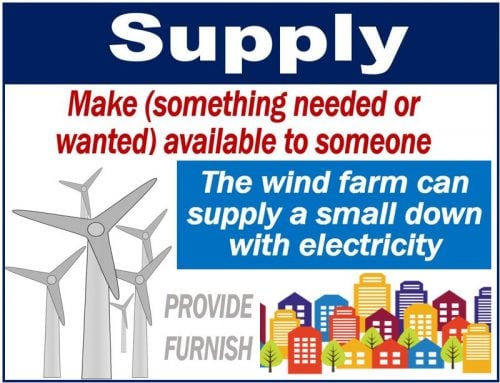What is supply? Definition and examples
The term ‘to supply’ means to provide, or to make something available to a company, person, or other entity. If I supply you with milk, I am your supplier and you are my customer. This act of providing, whether it’s goods or services, constitutes the foundational concept of supply in various sectors and markets.
The supplier is the seller or provider while the customer is the buyer or consumer.
Synonyms
Long-term
Often, the verb refers to something that happens over a long time (not always). Let’s imagine that somebody says: “That power plant supplies the town with electricity.” They are talking about making electricity available to businesses and residents of the town over the long term.
Take over
The verb may also mean to take over or replace, as in “When Harry died, nobody could supply his place.” However, its use with this meaning was more common in the past than today.
Stock or stash
The noun refers to an amount or reserve of something that is available for use, having been supplied.
For instance, a mother might bring a large supply of diapers (UK: nappies) on vacation with her baby, meaning she has a substantial amount readily available for use.
Substitute
The noun may also mean ‘substitute’ or ‘temporary.’ For example, a supply teacher is a temporary teacher who substitutes a teacher who is away or ill.
Provisions
The plural form of the noun, i.e., ‘supplies,’ may mean ‘provisions.’ If I am low on supplies, it usually means that I don’t have much food available.
In this sense, the term may also refer to medication, as in: “The refugee center is low on medical supplies.”

Etymology of supply
Etymology is the study of the history and origin of words. It is also the study of how the meanings of words have evolved.
- Verb
The verb, meaning “to help, support, maintain, fill up, make up for” emerged in the late fourteenth century. It came from the Old French word Soupplier, which meant “fill up, make full.” The Modern French word is Suppléer.
The Old French word came from the Latin word Supplere, which meant “complete, make full, fill up.”
In the 1520s, the verb also acquired the meaning “to furnish, provide.”
- Noun
With the meaning “assistance, relief, act of supplying,” the term emerged in the English language in the 15th-century. It came from verb.
In the 16th-century, it also acquired the meaning “that which is provided, quantity or amount of something provided.”
In the 1580s, it also began to mean “person who temporarily takes the place of another.”
It wasn’t until 1776 that it became an economic term, i.e., the corollary of ‘demand.’ In 1650, it also began to mean “necessary provisions held for distribution or use.”
Video – What is Supply?
Supply and demand
Supply and demand are two very common concepts in economics. They drive the prices of products and services in the marketplace. They also drive salary levels. In this context, the word ‘marketplace‘ means the same as ‘market‘ in its abstract sense.
In the world of economics:
– Demand represents how much of a good or service people want.
– Supply represents the quantity of a good or service that a market can offer. In other words, how much is available or how much can be provided over a specific period.
Effect of Supply/Demand on Prices
When demand for something grows faster than supply, its price usually rises. Conversely, if demand grows more slowly than supply, its price usually declines.
Economists perceive supply and demand as market forces.
Supply chain
The supply chain is the whole process of making, distributing, and selling commercial products.
It includes every stage, from extracting the raw materials to delivering the finished product to the ultimate consumer.
In other words, it includes everything, from a product’s point of origin to its point of consumption.
Common compound terms featuring ‘Supply’
There are several dozen compound words that include the term supply. Here are ten of the most common ones:
- Supply Chain
The route a product goes through from its raw material or farm to your shopping cart.
- Supply Demand
The relationship between the availability of a product and the desire for it within a market.
- Supply Side
Changes in production in the economy, often the result of government policy.
- Supply Curve
A graphical representation of the relationship between the price of a product or service and the quantity supplied for a specific period.
- Supply Management
The management and administration of the materials and goods that are required to keep an organization functioning.
- Supply Shock
An unexpected event, such as a war, hurricane, or earthquake that changes the supply of a product or commodity.
- Supply Room
A storage space where supplies are kept for future use.
- Supply Teacher (UK)
If a teacher is away for whatever reason, a supply teacher takes their place until they return.
- Supply Agreement
A contract between a buyer (supplier) and customer (buyer, consumer).
- Supply Depot
A place, such as a warehouse, where supplies are stored for distribution.

